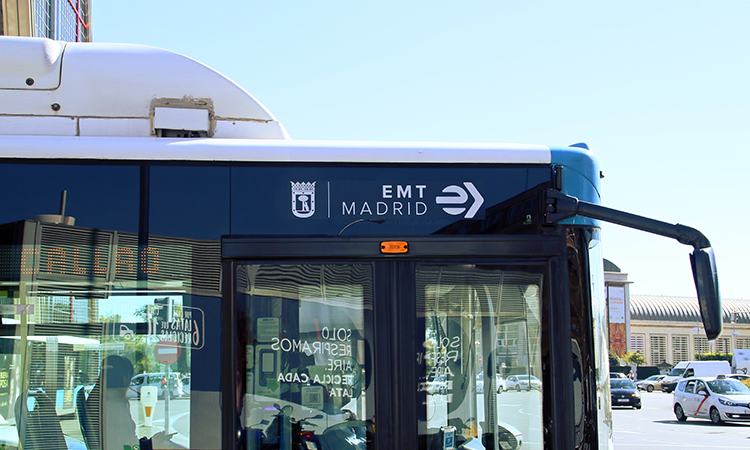Mayor of Madrid announces historic investment for EMT Madrid
- Like
- Digg
- Del
- Tumblr
- VKontakte
- Buffer
- Love This
- Odnoklassniki
- Meneame
- Blogger
- Amazon
- Yahoo Mail
- Gmail
- AOL
- Newsvine
- HackerNews
- Evernote
- MySpace
- Mail.ru
- Viadeo
- Line
- Comments
- Yummly
- SMS
- Viber
- Telegram
- Subscribe
- Skype
- Facebook Messenger
- Kakao
- LiveJournal
- Yammer
- Edgar
- Fintel
- Mix
- Instapaper
- Copy Link
Posted: 21 January 2022 | Intelligent Transport | No comments yet
To support EMT Madrid’s technological and sustainable revolution, the Mayor of Madrid has announced that the City Council of Madrid will be investing a historic €1 billion from 2021 to 2025.


On 14 January 2022, the Mayor of Madrid, José Luis Martínez-Almeida, presented the objectives and main projects of the ambitious strategic plan that will set the course for the Empresa Municipal de Transportes de Madrid (EMT Madrid) until 2025. During this presentation, the Mayor announced that the City Council of Madrid will allocate a historic investment of over €1 billion from 2021 to 2025 for the technological revolution of the public company.
Almeida has been proud of the EMT Madrid “like the rest of the people of Madrid” for being a public company with a history of 75 years, which he considers “a strength that allows it to provide essential services oriented to the general interest”, while positioning Madrid “as a leading company in sustainable mobility and a benchmark for the different modes of mobility.”
Accompanied by the Environment and Mobility Delegate, Borja Carabante, and the Managing Director of EMT Madrid, Alfonso Sánchez, the Mayor recalled that EMT Madrid is a model company in the provision of mobility services, and the Sustainability Strategy is vital to place the company at the forefront of sustainable mobility. In this sense, the financial projection of the Strategic Plan 2021-2025 positions EMT Madrid as the reference public body both at the national and European level for the provision of sustainable mobility services.
Five annuities
The investment plan is divided into five annuities of: €141.8 million in 2021; €215.5 million in 2022; €222.3 million in 2023; €247.2 million in 2024; and €175 million in 2025. Of the total investment, €534.7 million will be dedicated to the acquisition of a sustainable and efficient bus fleet, while €131.7 million will be dedicated to construction and €158.2 million to technical installations that will improve service to the city and the customer. More than €177.2 million will be allocated to other investments.
Internal and environmental analysis work
The 2021-2025 Strategic Plan has entailed an exhaustive internal analysis of the organisation, including its main assets (including more than 9,800 employees, as well as its fleets and infrastructures), financial results (an evolution that stands out for the solidity and stability in which revenues maintain growth), as well as the fundamental role that the company plays in the mobility of the city of Madrid. In 2019, it was responsible for 29 per cent of public transport trips.
The document also carries out a detailed current analysis of trends in transport and mobility, taking into account the political, economic, socio-cultural and technological environment, as well as the legal and regulatory context. Mobility is one of the sectors that has undergone a vertiginous transformation in the last decade, and the trends are oriented towards sustainability, digitisation, connectivity, improving the customer experience and the rise of new modes of transport such as shared mobility.
This analysis also affects the positioning of EMT Madrid compared to similar companies and performs an analysis of the general framework of mobility in the city of Madrid, as well as the impact that COVID-19 has had on reducing travel. With this data, projections have been made of different scenarios of recovery of the demand for services.
Purpose, objectives and strategic axes
The strategic formulation of the plan – which defines the purpose of EMT Madrid as a public company at the service of the city of Madrid and as a benchmark and integrator of sustainable mobility – assigns the company four corporate objectives:
- Be a green and decarbonised company with a sustainable energy model
- Promote customer orientation from excellence
- Ensure financial sustainability and growth through new businesses
- Drive digital transformation.
These challenges are based on eight axes that encompass the company’s strategy: operations; infrastructures; persons; financing; investments and improvement of efficiency; sustainability and corporate social responsibility; client; technology and innovation; and business development, diversification and alliances. For each of these axes, specific strategic objectives have been worked on.
After this theoretical exercise, the plan identifies three specific areas of action: the projects for the development of the current businesses (bus, car parks, BiciMAD, tow trucks and the advertising and business development service), the projects defined for the diversification towards new businesses analysing potential new markets and the projects defined for the improvement of the internal efficiency.
Current businesses, diversification and internal efficiency
The bus service must be prepared to respond to the increase in demand, the optimisation of operations, the development of new technologies, the transformation of the fleet and the development of new bus service transportation, such as high-capacity bus networks.
The plan contemplates the definition and construction of the operations centres of the future, addressing projects such as the new Las Tablas centre for low-emission buses and conceived in its design under environmental criteria. Also noteworthy is the La Elipa project, which will become the reference center for 100 per cent electric fleet management, will house 318 buses and its roof will house a large photovoltaic installation that will be an example of energy efficiency.
For BiciMAD, Madrid’s public electric bicycle system, a remodelling is planned based on four major initiatives: geographic expansion, technological transformation, orientation towards new B2B customers and the relocation of current facilities.
Other operations
The consulting activity, for its part, has the objective of reorganising and expanding the municipal company’s service portfolio in areas such as technology applied to mobility, accessibility, the development of energy solutions or the operation of other services of mobility.
Additionally, the strategic plan also dedicates considerable effort to the analysis of the different diversification possibilities for the municipal company, such as electric and shared mobility options, electric charging, natural gas, green hydrogen or potential real estate development.
Finally, the improvement of internal efficiency will make it easier for EMT to be a more agile, efficient and results-oriented organisation. Its principles have been applied in areas such as maintenance, operation, infrastructure, energy efficiency, employee relations, economic-financial efficiency, governance models, customer experience and institutional positioning.
This final work has resulted in the definition of 24 strategic projects that respond to all of the challenges and needs of the organisation and current mobility trends. A job that, sustained until 2025, will ensure that EMT Madrid, as a public company at the service of the city of Madrid and with the value provided by its human team of professionals, achieve its objective: position itself in sustainability, efficiency, circular economy, customer orientation, customer, financial sustainability, diversification, innovation and digital transformation.
Related topics
Alternative Power, Passenger Experience, Public Transport, Sustainable Urban Transport, Transport Governance & Policy
Related cities
Madrid
Related countries
Spain
Related organisations
Empresa Municipal de Transportes de Madrid (EMT Madrid), Madrid City Council
Related people
Alfonso Sánchez, Borja Carabante, José Luis Martínez-Almeida








